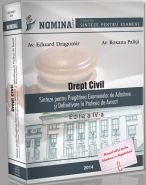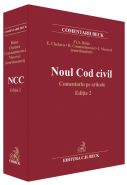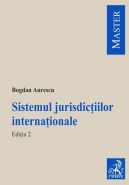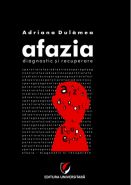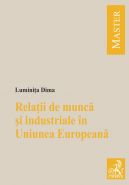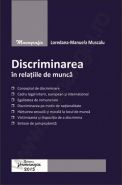Date: 2014-09-04
Translation from Romanian
INTERNATIONAL COMMERCIAL ARBITRATION IN ROMANIAIN TERMS OF SETTLEMENT OF FOREIGN INVESTMENT DISPUTES. YES OR NO?
Cristina ElenaCANDEA*
“When we speak of right, we mean not only civil right,
which is the usual significance of the word, but also morality, ethical
life and world-history. These belong to this realm, because the
conception taking them in their truth, brings them all together.”
Georg Wilhelm Friedrich Hegel [1]
Abstract: Romania, as the rest of the world, has, in the last twenty years, seen a fast progress as to the legislation and practice of the juridical regime of foreign investment and to the regulation of the international commercial arbitration. Why is the evolution of the international commercial arbitration important here? Romaniais a good choice for investment due to the advantages it offers. First, Romaniahas a significant geostrategic position: it lies at the crossroad of three large international markets: the European Union, the Balkans and the Commonwealth of Independent States. Romaniapresents itself as the access gate of the East to the single market of the European Union, being crossed by three Pan-European transport corridors[2]: corridor IV connecting Europefrom West to East, corridor IX connecting the North to the South and the corridor VII that facilitates the continental fluvial transport (the DanubeRiver). Romaniaitself is an important consumption market on a European level: ranking 9 in Europe, 2 in Eastern Europeand 7 in the European Union in terms of population. Therefore, the economic development was significant, resulting in the adjustment of the commercial arbitration, as the preferred way to settle differences. Since the ‘90s, when the first arbitration award was given in an investor-to-state case under the umbrella of a modern treaty on foreign investment, both the number of such treaties and the number of the arbitrable disputes in the field has significantly increased. For Romania, the ‘90s marked the realistic doctrinaire beginning of what can be seen as the first signs of an evolution in this area as well.
Keywords: doctrine, foreign investments, Romanian developments, arbitration award, juridical regime
The national legal framework of the historical challenge of international harmonisation
The Romanian arbitral doctrine and jurisprudence led to the basic judgment that the main purpose of the international commercial arbitration is internationalisation itself.
Although all the arbitration cases are currently conducted in a very well organised institutionalised framework, in the history of the arbitration, the arbitral procedure has gradually relied upon several regulations that shaped the international arbitration as we know it. The extra-territorial jurisdiction, which allowed the foreign powers to enforce their laws on their citizens in foreign states, was exercised under the treaties as well.[3] The international treaties played a key role in strengthening the arbitration and the effects of the arbitration awards; at the same time the scope of the arbitrable investment-related matters[4] became wider, putting an end to older controversies that emphasised the power of state courts.
The first modern legal steps for arbitration were seen in the codes of civil procedure at the beginning of the nineteenth century which were dominated by the liberal spirit of the French Revolution. In the Romanian Principalities, the basic pieces of legislation that regulated the arbitration procedure were: Donici’s manual (“Manualul lui Donici”) for Moldavia (1814); Calimach’s code (“Codul lui Calimach”) containing 11 chapters about the arbitration procedures and the 1818 Caragea’s Code (“Codul lui Caragea”) in Wallachia that treated the arbitration in 21 articles. The birth of Modern Romania following the Unionof the Romanian Principalities in 1859 was accompanied by the refreshment of the commercial arbitration, regulated under the new Code of Civil Procedure in 1865, mainly inspired by the Code of Civil Procedure of the Canton of Geneva (1819) and the French code (1806). It continued to exist until the instauration of the communist regime[5] in Romania. In all the official issues of the code at that time, Book V (On Arbitration) was accompanied by a note saying that “the institution of private arbitration is no longer used in practice nowadays, as citizens only address the courts of law or other state or public bodies with jurisdictional accountabilities to have their disputes settled”.
There are no constraints now in the Romanian arbitration system, which is undergoing a process of refreshment and tailoring to the requirements of the subjects who become parties to international arbitration cases.
Why is the international commercial arbitration in Romaniacommented upon together with the dispute settlement and the treatment of foreign investments?
First, because one of the means to protect foreign investments is the very way to settle such disputes, which leans to protection, guarantee and assurance of foreign investment in the contemporary world.
Although most of the relevant treaties[6]refer unequivocally to the institution that is to become competent to settle the dispute, there are certain aspects of a given case in relation to which the parties are free to choose and agree upon an arbitration clause under which the dispute can be settled by an arbitration court of their previous choice;this is referred to as the arbitration consent. The arbitration institution that will arbitrate the case is usually chosen based on where the investment is located and the way the arbitration award will be applied, with less emphasis on the roles of the subjects. Special cases occur when either party is a state, be it the host state or the investor state. In such cases, the institution of government responsibility in the field of foreign investment plays a key role[7]. In Romania, we can discuss about the confluence between the European Union, the international common law and the bilateral treaties on investments[8].
In the future, the main international arbitration institutions will most probably reach an agreement on certain aspects of international arbitration so as to collaborate with a view to publishing a comprehensive international treaty in this respect, which can provide an efficient and easy mechanism of investor-to-investor, investor-to-state or state-to-statearbitration. This international treaty network provides the foreign investors with a reliable method for the continuous enhancement of the scope of the international treaty.
Such driving purpose also relies on the fact that the body texts of the international investment treaties vary depending on their specificity, but they are also fairly similar in structure and content: most of them combine almost identical elements related to the promotion and protection of foreign investments by national harmonisation with a mechanism of investor-to-investor, investor-to-state or state-to-statearbitration, which will make these standards applicable by foreign investors. Only a compliant and uniform network of international treaties can provide the arbitration parties with a reliable method in the continuous efforts to enhance the scope of the international treaty.
There has been a debate at one point in Romania, as well as in the world, as to whether the protection of the national interests provided by the Constitution is affected by some facilities granted with a purpose to have a higher foreign capital entering the domestic market, but a formal decision stated[9]that it helped develop the national economy, which of course could not be regarded as failure to protect the national interests.
The foreign investor[10] is mainly subject to the juridical regime purposely established throughout the duration of the agreement on which its investment relies[11].
International institutionalised commercial arbitration
In my opinion, an international investment dispute means any misunderstanding or disagreement on an international de jure or de facto issue of juridical or political nature notified between two or several foreign investors or between a contracting state (or a given public group or a certain body dependent thereon) and the national of another contracting state, which is in direct relation to an investment. The definition of an investment dispute is relevant to choosing both the jurisdiction and the settlement method. The legal disputes are settled by specific jurisdictional means: international arbitration and international jurisdiction while the political disputes are settled by political and diplomatic means: negotiation, good offices, mediation, inquiry and conciliation. Any international law dispute related to foreign investment can be settled by mutual consultation, mediation, conciliation, negotiation and not last by international arbitration.
As far as I have seen, the arbitration conducted by ICSID (International Centre for Settlement of Investment Disputes) has, in the last ten years, become the predominant method to settle investment disputes between the investors and the host states but there are surely other combined arbitration methods employed as well.
A few international arbitration rules – including those laid down in the Convention on the settlement of investment disputes (ICSID), the International Chamber of Commerce (ICC) and the United Nations Commission on International Trade Law (UNCITRAL) – have been or are being revised. Alongside my colleagues, I am actively involved with proposals on tailoring the ADR rules and methods to the current, permanently changing and modernising requirements.
In the Romanian system, for instance, the investment/investor is defined in juridical terms as follows: by the domestic law under the following pieces of legislation - Law no 332/2001 on promoting the direct investments with significant impact on the economy, the Government’s Emergency Ordinance no 92/1997 on encouraging the direct investments, the Government Decision no 66/1997 on the regime of foreign investments in Romania by purchase of government bonds, republished – by the international public law under the conventions for mutual promotion and protection of the investments between Romania and 84 states, under the Convention on the settlement of investment disputes ratified by Romania in 1975 and by the European law – the “European law ”concept itself is relative and the distinction should be more precise depending on the reference field. Please note that the definitions and the terminological details given by the three protection levels do not always coincide, in which case the theoretical framework will be established by way of interpretation.
On their turn, each of these levels provides the juridical means for protection of the investment already made, in the sense that there are internal means of investment protection, means provided by international public law, and means resulting from the “European” law.
Unlike other states where the international arbitration has increased in the institutionalised framework of the large business centres referred to as such[12], the most important and renowned Romanian relevant institution is the Court of International Arbitration attached to the Chamber of Commerce and Industry of Romania. The Court of International Arbitration attached to the Chamber of Commerce and Industry of Romania was established in 1953 with a purpose to settle the foreign trade disputes. Under the Law no 335 of 3 December 2007 (Legea nr. 335 din 3 decembrie 2007), the Arbitration Court was reorganised as a permanent arbitration institution – without legal personality – attached to the Chamber of Commerce and Industry of Romania, to manage the international and national arbitration. According to the Regulations on the Organisation and Operation of the Court of International Commercial Arbitration attached to the Chamber of Commerce and Industry of Romania, the Court provides the following services: arbitration, consultancy on procedures, international cooperation, studies and research in the field of arbitration, internal co-operation within the system of Chambers in Romania. On all these levels, efforts aim at increasing the effectiveness of the cooperation within the international institutional arbitration system.
According to its own Rules of Arbitration Procedure (Regulile de procedur─ā arbitral─ā), the Court settles, de jure or ex aequo et bono, international disputes, under the arbitration agreement concluded by the contracting parties. The Court of Arbitration also settles domestic disputes.
The Arbitration Clause (Clauza de arbitraj) recommended by the Chamber of Commerce and Industry of Romania to be included in the commercial agreements reads: “Any dispute under or related to this agreement, including with respect to the execution, performance or termination hereof, shall be settled by means of arbitration, by the Court of International Commercial Arbitration attached to the Chamber of Commerce and Industry of Romania, in compliance with the Rules of arbitration procedure of the Court of International Commercial Arbitration, in force, published in the Official Monitor of Romania, Part I."
According to the Rules and information provided by the Court secretary, the dispute settlement by the Court of Arbitration has the following advantages: the awards are final and binding for the parties; they enjoy a wide international recognition as Romania ratified, alongside over 100 other countries, the United Nations Convention on the Recognition and Enforcement of Foreign Arbitral Awards in 1958; the arbitrators’ expertise – the arbitrators of the Court are highly qualified specialists in law and international commercial relations; confidentiality – the hearings are not public, and no one has access to the information on the dispute settlement by the Court of Arbitration; expediency – the arbitral proceedings take no longer than 12 months for international arbitration and 6 months for national arbitration; low costs – the arbitration fees are calculated as percentages, in decreasing instalments, of the claim matter value, according to the Regulations on Arbitration Fees and Expenses; also, the arbitration fee charged for the institutionalised arbitration includes the arbitrators’ fees. TheCourt of Arbitration has now 126 Romanian arbitrators[13] included on a List of Arbitrators and maintains a List of foreign arbitrators counting 50 people. The List of Arbitrators is currently undermodification.
The Decision no 6/2014 of the Management Board of the Chamber of Commerce and Industry of Romania on approving the Regulations on the Organisation and Operation of the Court of International Commercial Arbitration attached to the Chamber of Commerce and Industry of Romaniawas published in the Official Journal (Monitorul Oficial) of Romania, Part I, no 328 of 6 May 2014, and the Management Board of the National Chamber approved a new Regulation on the organisation and operation of the Court of International Commercial Arbitration attached to the Chamber of Commerce and Industry of Romania.
Composition of the Court of Arbitration; About becoming an arbitrator
According to the new regulation[14], The Court of Arbitration is made up of arbitrators confirmed by the Management Board of the Chamber of Commerce and Industry of Romania upon the proposal of the Court of Arbitration College, out of the individuals who meet the criteria set out in the regulation and the Rules of Arbitration Procedure. Individuals not on the List of Arbitrators can also act as arbitrators of the Court of Arbitration provided that the parties appoint them as such under the arbitration agreement in a given arbitration proceeding and they fulfil the conditions set out in the regulation and the Rules of Arbitration of the Court of Arbitration.
Romanian and foreign arbitrators can be included in the List of Arbitrators under the following terms: - they file a written application, including the person’s statement that he/she is familiar with the Court’s Rules of Arbitration; - they hold an academic degree for studies in law; - they have a legal background of minimum 8 years; - they fill in the questionnaire of the Court of Arbitration; - they have the approval from the College of the Court of Arbitrators. The College reviews the enrollment applications once a year. The duration of an arbitrator’s office is five years and can be extended.
Management of the Court of Arbitration and a few words on defining the arbitral tribunal[15]
The Court of Arbitration is managed by a college made up of a president and four members. The College of the Court of Arbitration is appointed by the Management Board of the Chamber of Commerce and Industry of Romania from the List of arbitrators for a three-year office, possibly renewable. The four members are proposed by the president of the Court of Arbitration.
The arbitral tribunal consists of a sole arbitrator or three (3) arbitrators appointed under the Rules of Arbitration of the Court of Arbitration. Substitute arbitrators are also appointed at the same time with the lead arbitrators. Arbitrators are appointed by the parties to the litigation as per the Court’s Rules of Arbitration Procedure. The arbitrators appointed by the parties appoint the third arbitrator under the terms and conditions laid down in the Rules of Arbitration of the Court of Arbitration. If the parties fail to appoint the arbitrators or the arbitrators fail to appoint the third arbitrator under the terms of the Rules of Arbitration of the Court of Arbitration, such appointments shall fall with the President of the Court of Arbitration. In enforcing the new rules, the College of the Court of Arbitration is to amend the List of Arbitrators based the criteria set out under the rules. Until the new rules of arbitration procedure, which are currently under preparation by the specialised committees, are completed, the arbitrators and the third arbitrator are appointed in compliance with the rules laid down in Book IV of the new Code of Civil Procedure[16]. The arbitrators handling cases that are pending before the Court of International Arbitration attached to the Chamber of Commerce and Industry of Romania as at the effective date of the Rules and for which the arbitral tribunal has already been set up under the former rules and the first arbitration hearing has not been conducted yet may be appointed by the parties under the Code of Civil Procedure within 10 days. Such 10-day term runs from the effective date of the Rules. The arbitrators for the trials pending before the Court of International Arbitration attached to the Chamber of Commerce and Industry of Romania which are past the first arbitral hearing can only be appointed with both parties’ consent, under the Code of Civil, by no later than the following arbitration hearing.
Pre-arbitral procedure and arbitral procedure
The Court of Arbitration may be addressed by the claimant by filing a request for arbitration / arbitration procedure. Such request for arbitration should contain the same elements as a request filed with a court of law except that the claimant should also attach a copy of the document containing the arbitration clause. The respondent must express his/her position to the claimant’s request for arbitration by way of a statement of defence. He/she can also file a counterclaim if he/she has, on his/her turn, claims against the claimant arising from the same legal relation.
As for the arbitration fees, these include: the registration fee, administrative fee, evidence producing expenses, document translation expenses, debate-related expenses, arbitrators’ fees, attorney, expert and advisor fees, travel expenses incurred by the parties, arbitrators, witnesses, experts and advisors, as well as other expenses generated by the dispute arbitration. The arbitration expenses can be shared by the parties if they agree so or, in absence of such an agreement, can be borne by the non-prevailing party.
As regards the deadline for dispute settlement, this is a real advantage as compared to the common law proceedings as the arbitral tribunal must give a ruling within 5 months from its setting up. However, the deadline can be extended for good reasons or upon the parties’ request.
The arbitral procedureconsists of hearings and debates, evidence producing and, finally, the settlement of the dispute by arbitration award. Exceptions regarding the existence or validity of the arbitration agreement or the setting up of the arbitral tribunal must be invoked by no later than the first hearing day, under penalty of preclusion. Public order exceptions can be invoked throughout the arbitral dispute.
The arbitral tribunal will apply the common law in the civil procedure as well as provisions of the European Convention of International Commercial Arbitration of the United Nations Commission on International Trade Law (UNCITRAL), adopted on 15 December 1976, unless the respective provisions conflict the relevant rules.
Arbitration award
The arbitral tribunal settles the dispute in compliance with the main agreement entered between the parties, the addenda, and based on the evidence produced, the applicable rules and, whenever applicable, commercial customs. It was noted in the case law and the literature that, after having been requested to settle an international dispute related to a foreign investment between a foreign investor and the host state,thearbitral tribunal establishes the law applicable to disputes, which can be the domestic law of the host state, the international law (conventional norm, customs, general law principles), the applicable law being chosen according to the particularities of the case.There is no rule forcing the arbitral tribunal to exclusively apply the domestic or the international law. The tribunal may, upon the express consent of the parties, settle the dispute ex aequo et bono based on its intimate conviction. The ruling is given in secret meeting.
The arbitration award is final and mandatory, with the same effects as a final and mandatory court order provided that it is rendered enforceable[17] by request from the prevailing party to the relevant court of law in the same jurisdiction as the Court of Arbitration. The arbitration award is a writ of execution and is applied as foreclosure, the same as any court order. It can only be revoked by an action for annulment[18], for any of the reasons provided under the Code of Civil Procedure. The arbitration award does not entitle the parties to waive their right to initiate an action for annulment against a potential arbitration award. Following the delivery of such award, the party can however waive the right to request the annulment.
The action for annulment of the arbitration award should be brought before the relevant court within one month from the delivery of the arbitration award, under penalty of preclusion.
Special provisions on the international arbitration and the ad-hoc arbitration
In the international disputes, the provisions of the international agreements to which Romaniais party are also applied, in conjunction with the Rules of Arbitration Procedure. The deadlines set for the settlement of the international disputes are twice as long. In such disputes, the nominating authority will rather appoint foreign arbitrators from the List of Arbitrators. The debates are conducted in Romanian, unless all the arbitrators agree to use a language for international communication. If either party is not familiar with the language of the debate, the arbitral tribunal ensures interpretation services, upon the request and on the expense of that party, and the parties may attend the debates in the presence of their respective interpreters. In any case however, the debates are conducted in the presence of an interpreter appointed by the arbitral tribunal.
The arbitration organised under the arbitration agreement between the parties by a third party, other than an arbitration institution constitutes the ad-hoc arbitration. The “ad-hoc” phrase must be explicitly included in the agreement entered between the parties. Any other wording in the text of the arbitration agreement shall make the dispute subject to the institutionalised arbitration. The ad-hoc arbitration offers the advantage that the arbitral tribunal made up of 1 or 3 arbitrators is chosen by the parties and follows the rules established under the arbitration agreement as regards the language and the place of arbitration (in absence of such provisions, the arbitral tribunal chosen will establish the place and the language). However, the arbitrators are independent and impartial in exerting their jurisdictional duties and may not be regarded as the parties’ representatives albeit appointed thereby.
As regards the legal provisions applicable to it, the ad-hoc arbitration is governed by the Code of Civil Procedure, art. 4 paragraphs (2) and (3) of the rules set out in the European Convention on International Commercial Arbitration signed in Geneva on 21 April 1961, and the Rules of Arbitration of the United Nations Commission on International Trade Law (UNCITRAL), adopted on 15 December 1976, as well as the Rules of Arbitration Procedure of the Court of International Commercial Arbitration, part II, chapter VIII. In such a dispute, the parties may, upon request, be assisted by the Court of Arbitration provided they pay the registration fee and the administrative fee. The assistance provided by the Court of Arbitration in relation to the ad-hoc arbitration consists in all or some of the following activities, as agreed with the parties: provision of data, information or documentation related to the doctrinaire and jurisprudential solutions to a given matter, as requested by the arbitrators; access to the secretarial services of arbitration consisting of receipt, registration and records of the correspondence, summoning of the parties and service of process, issuance of various notifications to the parties and arbitrators, note-taking during the debates, filing away documents, preparation and maintaining of records, as well as any such other works needed to ensure that the arbitration is properly conducted; provision of a proper location to conduct the arbitration; supervision and facilitation of the arbitration so that it could be properly conducted and completed within the deadline set by the parties.
Conclusion
In my capacity as an enlisted arbitrator of the Court of International Commercial Arbitration, I believe that arbitration is an elegant and much quicker way to settle disputes than in a court of law, by which a given dispute is resolved by final and mandatory award for the parties. Arbitration gives the parties the opportunity to choose their arbitrator, thus having a say on the composition of the arbitral tribunal. This way, those who opt for arbitration are entitled to choose their specialist, thus making sure the arbitration is governed by genuinely reliable and legal arbitration procedure and solutions. In the entire arbitration practice, both me as arbitrator and my colleagues in the List of Arbitrators have been ensuring equal treatment, fairness and respect for the right to defence and the principle of contradictoriality to all parties.
The continuous reformation of the arbitration in the current economic context in Romaniaas well as from the perspective of Romania’s status as European Union member state has become a priority. The new regulation of arbitration extended and harmonised with similar regulations of other European Union states[19] emerged in this context as well, being included as such in the new Romanian Code of Civil Procedure.
The simplified arbitration procedure, the manner and the place of arbitration, the costs and high qualification of the arbitrators are positive arguments for choosing the international commercial arbitration in Romania. The lack of continuous training of the arbitrators included in the List of Arbitrators is, in my opinion, a significant shortcoming. In order to have them continuously improve their professional training and integrate them into the international arbitration, courses following the CIArb pattern and a closer collaboration with CIArb to such purpose are much needed. Romaniadoes not only mean Eastern Europe, but also institutions adjusted and adjustable to the international law system, as internationalisation is the very main purpose of the international arbitration. The experience exchange and a very close ADR-related cooperation as well as the promotion of an image attractive for the investors are the guidelines for the future of international arbitration in this democratic state. In my opinion, maintaining and creating new cross-border work groups are essential for the genuine development of the international commercial arbitration. Cooperation among the national and international courts of arbitration should become closer, get through any hierarchy into an effective, entwined collaboration, as a mission to the only benefit of the investors who seek very good solutions to the disputes they may be involved in.
*Cristina Elena Candea, associate at Chartered Institute of Arbitrators and legal researcher at Legal Research Institute of the RomanianAcademy.
[1]Extract from “Elements of the Philosophy of Right” by Georg Wilhelm Friedrich Hegel (Romanian: “Principiile filosofiei dreptului” published by Paideia Publishing House, 1998).
[2]The Pan-European Corridors are a system of roads throughout the Central and Eastern Europe. The Corridors were defined at the second Pan-European Transport ConferenceinCretein March 1994, and supplemented at the third Conference held in Helsinki in 1997. Thus, regardless of the physical and geographical location of the routes that are part of this structure, they are also referred to as the Cretecorridorsor Helsinkicorridors.
[3]See A. Heyking, „L’exterritorialité et ses applications en Extrême-Orient” (1925) 7 RDCADI 237.
[4] For instance, it was stated during some contemporary conferences whose agenda included the topic of arbitrality, that such litigations arising from administrative agreements in general and from public procurement agreements in particular, in so far as they are related to the interpretation, execution, nullity, resolution or termination thereof and to the extent they contain arbitration clauses that are valid and enforceable under the relevant common law, are and will remain arbitrable regardless of the time the arbitration agreement was concluded and the litigation started.
[5]The communist era did not radically oppress the Romanian arbitration system. Emeritus professor Brandusa Stefanescu says on the subject: The greatest merit of the arbitrators and, hence, of the Arbitration Commission in the communist Romania remains however their contribution to maintaining the Romanian commercial code in force and applicable whenever the agreement involved in the international commercial litigation was subject to the Romanian law, as the “Codicele de comerciu” has not been – as it is well known – rescinded until 2011, unlike other commercial law making in other socialist states. “Pandectele Romane”, issue 8/2013 Wolters Kluwer, 2013-08-31
[6]Since 1975, Romaniahas been part of the Convention on the Settlement of Investment Disputes between States and Nationals of Other States concluded in Washingtonin 1965, referred to as the ICSID Convention. The Convention regulates the establishment and operation of the International Centre for Settlement of Investment Disputes (ICSID in English, CIRDI in French). The Convention contains provisions regarding the settlement of the investment disputes by conciliation or arbitration. The rules of procedure are detailed under the regulations approved by the Administrative Council, among which the Rules of arbitration are the most important, detailing the rules of based on which the arbitration will be conducted and containing all the information that an attorney needs in order to conduct the arbitration of the dispute. The ICSID Convention and the Rules are posted on the ICISD website.
[7]. Here we refer to the competence‘ratione personae’ which is given by the host state imputing the investment to a potentially illicit deed and qualifying the private individual as investor. The arbitral practice of settling the exceptions of competence but also the doctrine have identified:
- the liability of the state for the deeds of its executive bodies; - the liability of the state for the deeds of its legislative bodies;- the liability of the state for the deeds of its judicial bodies; - the liability of the state for the deeds of its territorial subdivisions;
- the liability of the state for the deeds of its subordinated bodies; - the liability of the state for the deeds of the entities empowered to exercise public power prerogatives; - the liability of the state for the deeds of entities acting on its behalf. Many of these disputes regarding such responsibilities can be referred to arbitration institutions existing in the state where the investment is located.
[8]I authored the study Confluen┼Ża dintre Uniunea European─ā, dreptul interna┼Żional cutumiar si tratatele bilaterale privind investi┼Żiile. The study was published in the book “Justitie, stat de drept si cultura juridica,” Papers delivered at the scientific session of the “Acad. Andrei Radulescu” Legal Research Institute; Universul Juridic Publishing House, Bucharest, 2011, 1119 pg; ISBN 978-973-127-561-1.
[9]DECISION no 74 of 13 July 1994 on the constitutionality of the Law on granting extra facilities as compared to Law no 35/1991 (Legea nr. 35/1991), republished, on attracting foreign investors to the industry (CONSTITUTIONAL COURT), published in the Official Journal (Monitorul Oficial) no 189 of 22 July 1994.
[10]The investors are granted all benefits arising from the status of European investment, as well as the facilities under the free trade treaties with countries of the European Union, the European Free Trade Association, the Central European Free Trade Association or those arising from Romania’s status as member state of the World Trade Organisation (since January 1995), including the access to state or European funding.
[11]See (THE PARLIAMENT OF ROMANIA, CHAMBER OF DEPUTIES, the Commission for Industries and Services) the REPORT of the Investigation Committee on the Sterling Resources Ltd Oil Agreement in the context the amendment of the Oil Law no 238/2004 and other related rules.
[12]For example, the Dubai International Financial Centre (DIFC).
[13]The enlisted arbitrators have exclusively legal education and high professional qualification, most of them holding a PhD degree in law.
[14]The Rules of Arbitration Procedure of the Court of International Commercial Arbitration issued by the Chamber of Commerce and Industry of Romania were published in the Official Journal (Monitorul Oficial) of Romania, Part I, no 184 of 2 April 2013.
Pursuant to art. 98, the rules become effective on the date approved by College of the Court of Arbitration as per the provisions of the Law no 335/2007, as further amended and extended, and will be published on the website of the National Chamber, the county chambers, in the Arbitral Codex and the Official Journal (Monitorul Oficial) of Romania, Part I.
[15]According to the Decision no 6/2014 of the Management Board of the Chamber of Commerce and Industry of Romaniafor the approval of the Regulation on the organization and operation of the Court of International Arbitration attached to the Chamber of Commerce and Industry of Romania
[16]We can talk about a real, both substantive and formal, reorganisation of the arbitration institution from the perspective of the new Code of Civil Procedure. The arbitration institution is presented in the same book (Book IV), but it includes 7 titles. The seven headings are dedicated to the general provisions on arbitration, arbitral agreement, arbitral tribunal, arbitration procedure, cancellation of the arbitration award, enforcement of the arbitration award and institutionalised arbitration (articles 533 to 612). As regards the arbitral procedure discussed in Title IV of Book IV, it contains provisions on filing claims to the arbitral tribunal, the arbitral hearings, arbitral expenses and arbitration award, organized in chapters. The institutionalised arbitration is for the first time regulated under the Code of Civil Procedure in the final title of Book IV (Title VII)-articles 1096 to 1118. The international arbitration is however treated separately in Book VII (International civil trial), Title IV, which is organised in two chapters: The international arbitral trial (Chapter I) and the Effects of foreign arbitral awards (Chapter II). Each title and chapter, respectively, contains the name of the regulation broken down by articles, which makes the Code of Civil Procedure a tool far more adequate to its intended purpose. The law under which the Code of Civil Procedure was adopted (Law no 134/1 July 2010) was published in the Official Journal (Monitorul Oficial) of Romania, Part I, no 485 of 15 July 2010.
[17] ByRegulations prior to 1989, the Presidium of the Chamber of Commerce could render enforceable the decisions of the Court of Arbitration, upon the concerned party’s request; such argument is also invoked by the foreign doctrine as being able to justify the nature of state jurisdiction conferred upon the arbitration.
[18]The High Court of Cassation and Justice decided that, pursuant to art. 364 letter i) of the Code of Civil Procedure (art. 608 paragraph 1 letter h of NCPC – the new Code of Civil Procedure), the arbitration award can be cancelled by action for annulment whenever such decision breaches the public order, morality or imperative legal norms. The High Court emphasised that the assumption regulated under this piece of legislation does not allow the examination of the reliability of the arbitration award due to the fact that the arbitration competence excludes the competence of the court of law for the dispute subject to the arbitration award, and the action for annulment does not have the devolutive effect of the appeal, as the courts of law only exercise control on the legality and not on the reliability of the arbitration award. Therefore, the appellant’s references to an alleged exception of lack of interest as well as to the absence of a certain, liquid and payable receivable of the opposite party are matters of substance going beyond the legality control that is possible during the action for annulment and, certainly, during the appeal against such an award. (Appeal Decision no 90 of 17 January 2014 given by the Second Civil Department of the High Court of Cassation and Justice regarding the action for annulment of an arbitration award- Decizia nr. 90 din 17 ianuarie 2014 pronun┼Żat─ā în recurs de Sec┼Żia a II-a civil─ā a Înaltei Cur┼Żi de Casa┼Żie ┼¤i Justi┼Żie)
[19] The legislative harmonisation with the European Union standards allows for the development of initiatives that follow the standards of any member state, also taking advantage of the local competitive advantages. The air and sea infrastructure developed and in process of modernisation meets the needs for making the national and international transport of goods more efficient. Romaniahas one third of River Danube, 200 km of shore and the largest harbour to the Black Sea- Constan┼Ża.

 Cosul de Cumparaturi
Cosul de Cumparaturi Yahoo Messenger
Yahoo Messenger


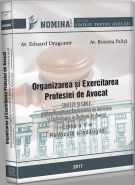
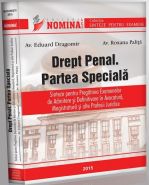
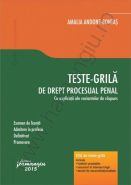
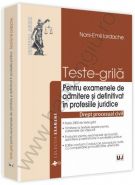

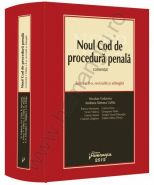
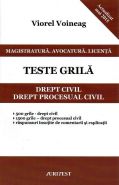



![Contracte speciale [Sinteze. Modele de contracte. Teste grila] | Autor: Tabaras Manuela](http://librariejuridica.ro/userfiles/productboximages/product_679.jpg)

